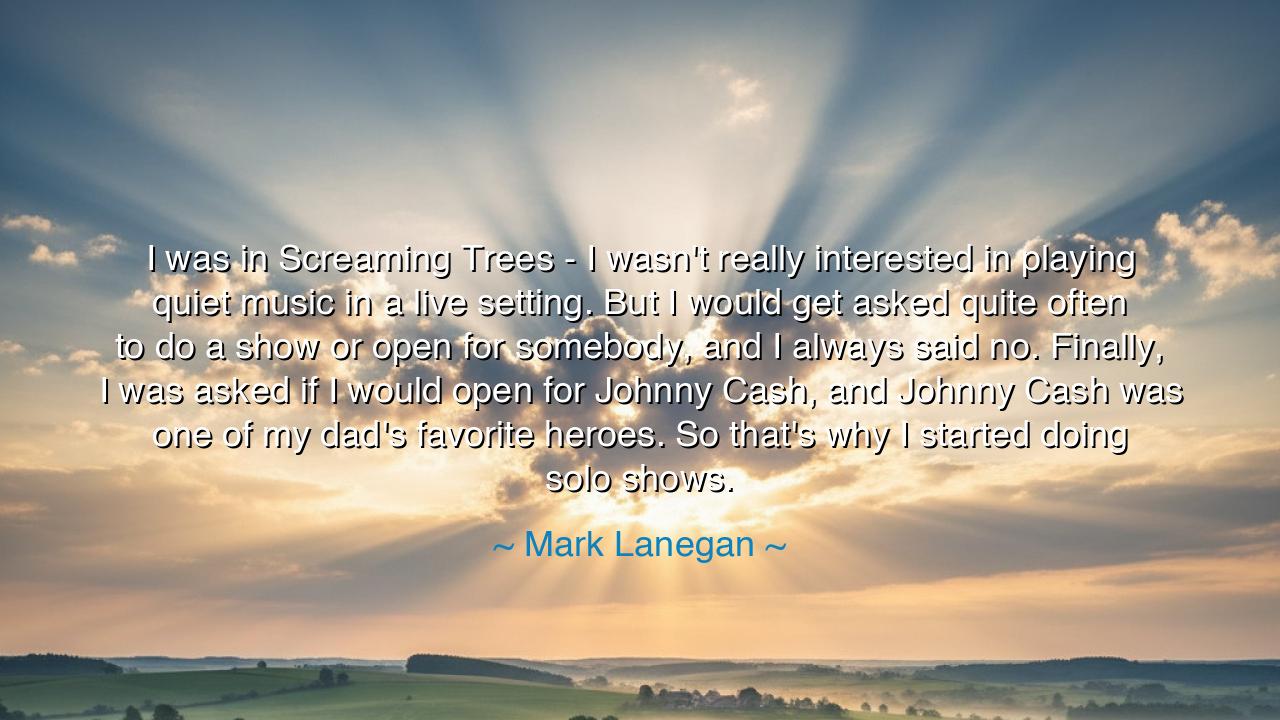
I was in Screaming Trees - I wasn't really interested in playing
I was in Screaming Trees - I wasn't really interested in playing quiet music in a live setting. But I would get asked quite often to do a show or open for somebody, and I always said no. Finally, I was asked if I would open for Johnny Cash, and Johnny Cash was one of my dad's favorite heroes. So that's why I started doing solo shows.






“I was in Screaming Trees—I wasn’t really interested in playing quiet music in a live setting. But I would get asked quite often to do a show or open for somebody, and I always said no. Finally, I was asked if I would open for Johnny Cash, and Johnny Cash was one of my dad’s favorite heroes. So that’s why I started doing solo shows.” Thus spoke Mark Lanegan, the gravel-voiced bard of the grunge era, whose words carry the weight of humility, love, and destiny intertwined. Though spoken casually, his reflection conceals a profound truth about the power of honor, legacy, and the unseen forces that guide an artist’s heart. It is a reminder that sometimes the greatest shifts in our lives do not come from ambition or desire, but from reverence—from the quiet wish to honor those who shaped us.
In this quote, Lanegan speaks not only as a musician, but as a son. For years, he had lived in the tempest of Screaming Trees, a band known for its raw power and unrelenting sound, the voice of an age that demanded rebellion. Quiet music did not call to him—it seemed too vulnerable, too exposed. Yet when the name Johnny Cash entered his life, it stirred something far deeper than artistic curiosity. Cash, the man in black, symbolized the archetype of authenticity, a bridge between sin and redemption, rebellion and grace. More than that, he was a figure Lanegan’s father revered. In honoring Cash, Lanegan found a way to honor his father. Thus, what reason and career had never moved him to do, love and memory accomplished in an instant.
The ancients would have recognized this as an act of filial piety, that sacred duty to one’s ancestors and parents that transcends personal will. In many traditions—the Greek, the Roman, the Eastern—the honoring of one’s forebears is considered a path to wisdom. For in remembering those who came before, one remembers the roots of one’s own soul. Lanegan’s decision to perform solo was not merely a musical choice; it was an act of continuity, a thread binding generations through the shared rhythm of admiration. His father’s hero became his own, and through that gesture, the son carried forward the father’s song.
Consider the story of Telemachus, son of Odysseus. For years, the young man lived in uncertainty, unsure whether to take up his father’s mantle or remain in obscurity. But when he finally heard tales of his father’s valor, something ancient awoke within him—a call of blood and lineage. He set out to find his father, not for glory, but for understanding. So too did Lanegan, through music, rediscover his own lineage—the bond of sound, spirit, and reverence that connected his life to his father’s dreams. It was not fame that moved him, but love that whispered, “This, too, is part of who you are.”
The lesson in this story is not confined to music—it is the story of all who eventually return to what matters most. There are times when the world invites us to act for ambition’s sake, and we refuse. But when the call comes from the heart, from something sacred and human—a memory, a mentor, a parent, a promise—then even the most reluctant soul rises. Lanegan’s journey teaches that the most meaningful acts of creation often begin not in ego, but in gratitude. When we act to honor those who shaped us, our work gains a depth beyond artifice; it becomes an offering, a continuation of something eternal.
And yet, there is more here. For Lanegan, a man once known for the storm and roar of grunge, was called to the quiet. In stepping into that space, he discovered a new voice—a voice stripped of noise, laid bare before his listeners. In that vulnerability, there was transformation. The very thing he once resisted became the vessel of his deepest truth. How often it is so: what we most avoid is the very place our soul longs to grow. The quiet, once dismissed, became his revelation.
Thus, let this be the wisdom drawn from his words: do not turn away from the call that comes through love. Whether it arrives through a parent’s memory, a friend’s faith, or a hero’s legacy, listen when your heart stirs with reverence. For that is no mere coincidence—it is the echo of your own destiny. And when life asks you to step into the unfamiliar, to play the music you once refused, do not fear the change. The soul grows not through comfort, but through surrender to what feels sacred.
In the end, Mark Lanegan’s story is not only about a musician who played for Johnny Cash—it is the story of every person who finds meaning by connecting past and present, sound and silence, father and son. Through that act of love, his art transcended the stage. It became a hymn to honor, to heritage, and to the quiet truth that sometimes the deepest music we play is not for the world, but for the ones who made us who we are.






AAdministratorAdministrator
Welcome, honored guests. Please leave a comment, we will respond soon